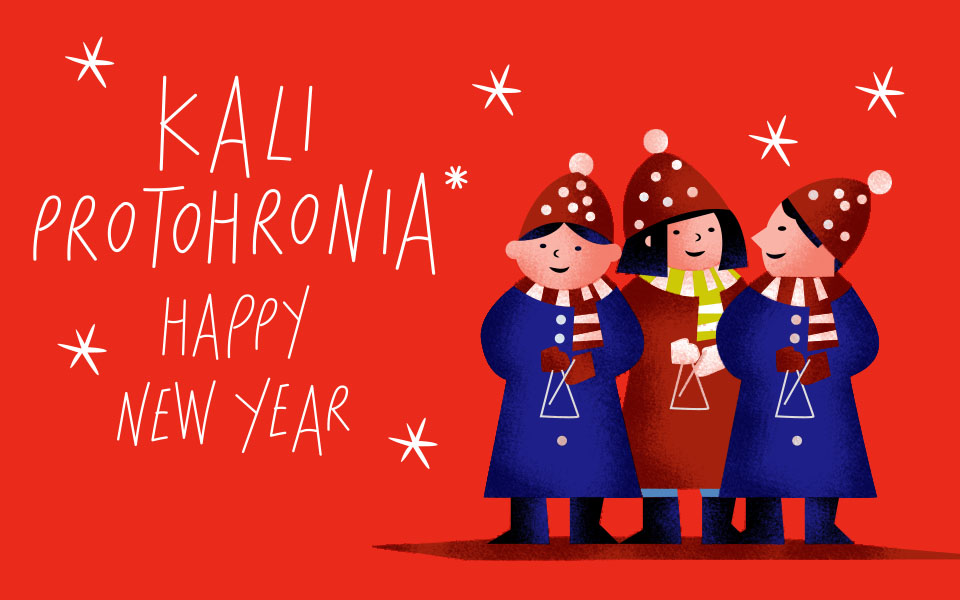The first time I went to a Greek wedding, a fellow non-native Greek speaker offered a friendly piece of advice: “You should try to learn all the greetings. You won’t get them right of course – but it’ll be funny.” She was right. In the receiving line, I mixed up the phrase meant for the couple and the one for the best man, then looked the father of the bride straight in the eye and mumbled “za za zoo” instead of “na sas zisoun” – an impossible phrase to pronounce without extensive practice, it means “may they live.”
Greeks are often bothered by the fact that there are no English translations for many common courteous phrases, such as “kali orexi,” for example. (This particular lack forces waiters at tourist destinations across Greece to resort to the French “bon appetit.”) In Greek, not only is there a way to wish someone a good appetite before a meal, but there is another phrase for wishing them good digestion once they’re finished eating – “kali honepsi.”
It seems the Greek language has a special greeting or wish for every occasion, and sometimes for no real occasion at all: there are several ways to encourage someone to enjoy a new purchase or a new haircut; there’s a greeting for the beginning of the week and the end of the work week; and there are several that are used to address the relatives of a person who’s actually celebrating something.
Greek small talk is so dependent on these phrases, in fact, that when it’s someone’s birthday, a whole conversation can be had using such wishes alone. When the government announced its measures for limiting the spread of Covid-19, a new way was quickly chosen for ending zoom calls and brief chance encounters on the street; “kali lefteria,” normally used to wish a woman good luck with a birth, is now also used to express a desire for the end of lockdown (“lefteria,” or “eleftheria,” means freedom).
Below is a list of greetings and benedictional phrases which, if you use them right, will make you sound like a local.
General
Hronia polla (χρόνια πολλά): meaning “many years,” as in “and many more” or “many happy returns,” it is the most common Greek wish, used at most celebrations, including birthdays, name days and holidays.
Kai tou hronou (και του χρόνου): meaning “and next year,” this is used in roughly the same way as hronia polla, for celebrations and good times. It can be followed by specific wishes for the coming year, such as “me igeia,” meaning “with health.”
Kali dunami (καλή δύναμη): meaning “good strength,” this is said to someone about to tackle something difficult or tiring.
Kali epitihia (καλή επιτυχία): this means “good luck” and is most commonly said to someone about to do something difficult, such as taking a test, or opening a business.
Kali tihi (καλή τύχη): also meaning “good luck,” this version is more often used in situations where luck equals chance, such as the buying of a lottery ticket.
Kali evdomada (καλή εβδομάδα): this means “good week” and is said on Mondays.
Kalo mina (καλό μήνα): this means “good month” and is said on the 1st of every month.
Kalo Savvatokiriako (καλό Σαββατοκύριακο): meaning “good weekend,” this is said on Fridays.
Me to kalo (με το καλό): meaning “all being well,” this is used similarly to “God willing.”
Na ise kala (να είσαι καλά): meaning “may you be well,” this versatile phrase can be added to a list of wishes at special occasions, but is most commonly used to thank someone, either for a favor or, often, for their wishes to you.
Na pas sto kalo (να πας στο καλό): this means farewell, and is said on parting.

© Illustration: Philippos Avramides
Holidays
Christos anesti (Χριστός ανέστη): meaning “Christ has risen,” this is said at the Anastasi celebration of the resurrection of Christ, on the eve of Holy Saturday.
Alithos o kirios (αληθώς ο Κύριος): meaning “truly, the lord,” this is the response to “Christos anesti.”
Kales giortes (καλές γιορτές): meaning “happy holidays,” this is used to wish someone a good religious holiday.
Kala hristougenna (καλά Χριστούγεννα): this means “Merry Christmas.”
Kala koulouma (καλά κούλουμα): meaning “a good Clean Monday,” this is said on the first day of Lent in the run-up to Easter.
Kali anastasi (καλή ανάσταση): meaning “good resurrection,” this is said during Holy Week, in the run-up to the celebration of the resurrection of Christ.
Kali hronia (καλή χρονιά): this means “Happy New Year.”
Kali protohronia (καλή πρωτοχρονιά): this also means “Happy New Year.”
Kali sarakosti (καλή σαρακοστή): meaning “good 40-day lent,” this is said at the beginning of Lent, in the run-up to Easter.
Kalo pasha (καλο πασχα): this means “Happy Easter.”
Weddings
Kai sta dika sou (και στα δικά σου): this means “and to yours” and is said to unmarried guests at weddings, expressing the hope of getting together again soon at their wedding.
Kala stefana (καλά στέφανα): meaning “good wreaths,” this refers to the wedding wreaths that are ceremoniously placed on the couples’ heads during the wedding and is used as “Have a wonderful wedding.”
Na sas zisoun (να σας ζήσουν): this means “May they live” and is said to the parents of the bride and groom.
Na zisete (να ζήσετε): this means “May you live” and said to the happy couple.
I ora i kali (η ώρα η καλή): this means “The time is good,” and is said wish the couple a happy wedding.
Kalous apogonous (καλούς απογόνους): this means “good offspring,” and is said to the couple as a fertility blessing.
Panta axia (Πάντα άξια): meaning “always worthy,” this is said to the maid of honor.
Panta axios (Πάντα άξιος): this also means “always worthy” and is said to the best man.
Vion Anthosparton (βίον ανθόσπαρτον): this means “a life full of flowers.” It’s derived from Ancient Greek, and is said to the couple directly after the wedding.
Baptisms/new baby
Kali lefteria (καλή λευτεριά): this meaning “good freedom” and is said to a pregnant woman, wishing her a good birth.
Me ena pono (με ένα πόνο): meaning “with one pain,” this is another wish for an easy birth that can be expressed to pregnant women.
Na sas zisei (να σας ζήσει): this means “May he/she live (a happy life)” and is said to the family of a newborn baby, either the first time you see the infant or at its baptism.
Panta axia (Πάντα άξια): meaning “always worthy,” this is said to the godmother at a baptism.
Panta axios (Πάντα άξιος): this also means “always worthy” and is said to the godfather at a baptism.

© Illustration: Philippos Avramides
Birthdays
Hronia polla (χρόνια πολλά): this means “many years”, as in “and many more.”
Na hairese… (να χαίρεσαι…): this means “May you cherish…” To complete this wish, add whatever is good in the life of the person being celebrated, such as “tin ikogenia sou,” meaning “your family.”
Na ta ekatostiseis (να τα εκατοστίσεις): this means “May you live to be a hundred years old.”
Na ton/tin hairese (να τον/την χαίρεσαι): meaning “Cherish him/her,” this is said to the relatives of the birthday celebrant.
Oti epithimeis (ότι επιθυμείς): this means “May your wishes come true.”
Polihronos/polihroni (πολύχρονος/πολύχρονη): meaning “long-lived,” this is used to wish the birthday celebrant a long life.
Name days
Hronia polla (χρόνια πολλά): this means “many years”, as in “and many more.”
Na hairese to onoma sou (να χαίρεσαι το όνομά σου): this means “Cherish your name.”
Na ton/tin hairese (να τον/την χαίρεσαι): this means “Cherish him/her,” and is said to the relatives of the person celebrating their name day.
Oti epithimeis (ότι επιθυμείς): this means “May your wishes come true.”
(Learn more about Greek name days and how they are celebrated, and find out when yours is, here.)
Funerals
Zoi se mas (ζωή σε μας): meaning “life to us,” this respectful way to express the idea that life goes on is used between members of a grieving family.
Zoi se sas (ζωή σε σας): meaning “life to you,” this is said to the bereaved by those outside the family.
Silipitiria (συλλυπητήρια): this means “condolences.”
Eonia i mnimi (αιωνία η μνήμη): this means “eternal memory,” as in to say: “May he/she be remembered forever.”
Na zisete na ton/tin thimaste (να ζήσετε να τον/ την θυμάστε): this means ”May you live to remember him/her.”
When you get something new
Kaloriziko (καλορίζικο): from the words for “good” and “roots,” this is said to congratulate someone on a big purchase.
Kalotaxido (καλοτάξιδο): this means “May it travel well,” and is used to congratulate someone on getting a new vehicle.
Me geia (με γεια): meaning “with health,” this is used to congratulate someone on a purchase or a haircut.
During a meal
Geia sta heria sou (Γεια στα χέρια σου): this means “health to your hands” and is used as a blessing for the hands of the person who cooked your meal.
Kali honepsi (καλή χώνεψη): meaning “good digestion,” this is said at the end of a meal.
Kali orexi (καλή όρεξη): this means “good appetite” and is said before a meal.
Stin igia mas / Yiamas (στην υγειά μας / γειά μας): this means “to our health,” and is used when raising glasses in a toast.
Stin igia sou / Yiasou (στην υγειά σου / γειά σου): meaning “to your health,” this is used to single someone out when toasting.
For health
Yiasou (γεια σου): this means “your health” and is used as “Bless you” when someone sneezes.
Geitses (γείτσες): this shares the same root as “yiasou” (“γεια,” meaning health) and is also said when someone sneezes.
Kali anarosi (καλή ανάρρωση): this means “good recovery.”
Kala apotelesmata (καλά αποτελέσματα): meaning “good results,” this is used to wish someone good medical test results.
Perastika (περαστικά): this means “passing” and is used as “Get well soon.”
Siderenios (σιδερένιος): from the word “sidero,” meaning iron, this is used to wish someone strength when they are battling an illness.

© Illustration: Philippos Avramides
Travel & fun
Kali diaskedasi (καλή διασκέδαση): this means “Have fun.”
Kales diakopes (καλές διακοπές): this means “Have a good vacation.”
Kali antamosi (καλή αντάμωση): this means “so long” or “until we meet again.”
Kalo taxidi (καλό ταξίδι): this means “Have a good trip.”
Kala na perasis (καλά να περάσεις): this means ”Have a good time.”
Work, school & military service
Kala apotelesmata (καλά αποτελέσματα): meaning “good results,” this is used to wish someone good test results on an exam.
Kales doulies (καλές δουλειές): this means “good business” and is used when someone opens a new business, and at the beginning of a busy season.
Kali arhi (καλή αρχή): meaning “good start,” this is said to someone starting a new job, or a new school.
Kali proodo (καλή πρόοδο): this means “good progress” and is said to congratulate a school graduate.
Kali stadiodromia (καλή σταδιοδρομία): this means “good career” and is used to congratulate a university graduate, or someone moving up in their career.
Kali thiteia (καλή θητεία): this means “good service” and is said to someone beginning their military service.
Kalos fantaros (καλός φαντάρος): meaning “good soldier,” this is another way of wishing someone well as they begin their military service.
Kalos politis (καλός πολίτης): this means “good citizen” and is said to those completing their military service, as well as to prisoners completing their jail time.
Did we forget something? Send us any suggestions for this list on Instagram, @greece_is.












